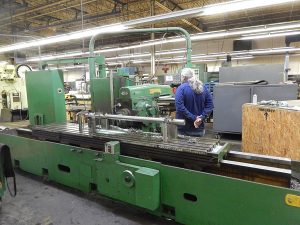Contract manufacturing provides a wealth of benefits for those who use it, but how do you know which company with whom to partner?
One way to decide on a contract manufacturer is to find what types of services they provide.
Types Of Contract Manufacturing
 Here, you’ll find the most common types of contract manufacturing services described in detail.
Here, you’ll find the most common types of contract manufacturing services described in detail.
Beyond that, we’ll take a look at how to determine which company to choose based on the services they provide.
Complex Assembly
Most types of manufacturing require some level of assembly. A company that provides complex assembly services has experience fabricating and working with complicated components, and they’ll be able to build assets that involve many moving parts.
These types of services are ideal for companies that rely on elaborate mechanical assets to fulfill their operational needs. Assembly lines, aircraft manufacturers, and fabrication plants might require complex assembly services to build needed components.
Die Casting
Die casting is a process in which liquid metal is forced into a mold at high pressure. Most die casting is done using non-ferrous metals, i.e. metal that doesn’t contain iron, such as aluminum, copper, brass, etc.
This type of service is best for manufacturing components that have many complex details. It’s not ideal for large components that might have to endure a lot of stress, so heavy industrial operations may not benefit as much from this process.
Grinding, Milling, and Broaching
Grinding, milling, and broaching all have to do with shaping metal by removing material.
Each method uses different types of tools and processes:
Grinding
Grinding uses an abrasive surface to shape and cut surfaces, such as with a grinding wheel.
Milling
Milling is a process where a cutting tool is advanced into the material to shape it down.
Broaching
Broaching uses a toothed tool, or broach, to remove the material with either linear or rotary motions.
The exact processes you choose will depend on what types of components you need to be made, but they all allow for the shaping of material down from a larger piece. As such, much tougher materials may be used in these processes.
Forging
In forging, metal is heated and subjected to compressive forces, either with a hammer or a die. It’s ideal for creating tough components that don’t necessarily need complex shaping, though it can be combined with milling and grinding in order to achieve more elaborate results.
Forging is best for components that will be subjected to high levels of stress in heavy duty applications.
CNC Machining
CNC stands for “computer numerical control,” and it is the process of using a computer to guide manufacturing processes. With CNC machining, a computer system dictates how and when components in a process move, making it ideal for making highly precise manufacturing.
If you need components or products that must adhere to the most stringent of specifications, CNC machining is probably one of the services you’d want to look for when choosing a contract manufacturer.
Sheet Metal Forming
For applications that need large pieces of metal, sheet metal forming is the ideal type of contract manufacturing.
Sheet metal is bent and formed to the shape you need, making it ideal for building tanks and vessels for use in a variety of industries.
These processes often use stainless steel, but other metals may be formed as well depending on the application.
Machine Control Assembly
Moving beyond the machining aspects of contract manufacturing, many operations need machine controls on top of complex mechanical assets. This type of contract manufacturing relies on electrical expertise, and so it tends to be somewhat specialized.
Machine control assembly service providers will build all needed components, make sure they fit together, and then assemble them on your machinery.
Choosing A Contract Manufacturing Company
Choosing the right contract manufacturing company will depend on the types of components you need to be built.
When considering your needs, take into account the following factors:
Durability
If you need something that will withstand harsh environments, you’ll probably want to go with a contract manufacturer that provides services such as forging, milling, and broaching.
Alternatively, if you don’t need a lot of durabilities, die casting may be better for smaller components, while sheet metal forming is best suited for larger applications.
Complexity
The complexity of your components is key.
The higher the complexity, the more precision you’ll need in the contract manufacturing process. If you need something that’s built to very precise specifications, die casting, milling, and CNC machining are likely the services you’ll want to go after.
Size
Large applications rely on large pieces of material. As such, sheet metal forming services are probably the best option to look for when assessing a contract manufacturer’s capabilities.
Medium and small-sized components, on the other hand, may benefit from forging and casting processes since those would allow for greater levels of strength.
Automation
If you’re looking for products to assist in automated processes, you’ll probably need someone capable of complex assembly.
CNC machining can be of further use since it guarantees the tight-fitting components you need to build a reliable system.
Partnering With A Contract Manufacturing Company
Aside from the types of contract manufacturing services provided, you’ll also want to choose a company you know you can trust.
Check out their credentials as well as their capabilities, and you’ll be able to find the right contract manufacturer for your needs.





 Contract
Contract Food & Bev
Food & Bev